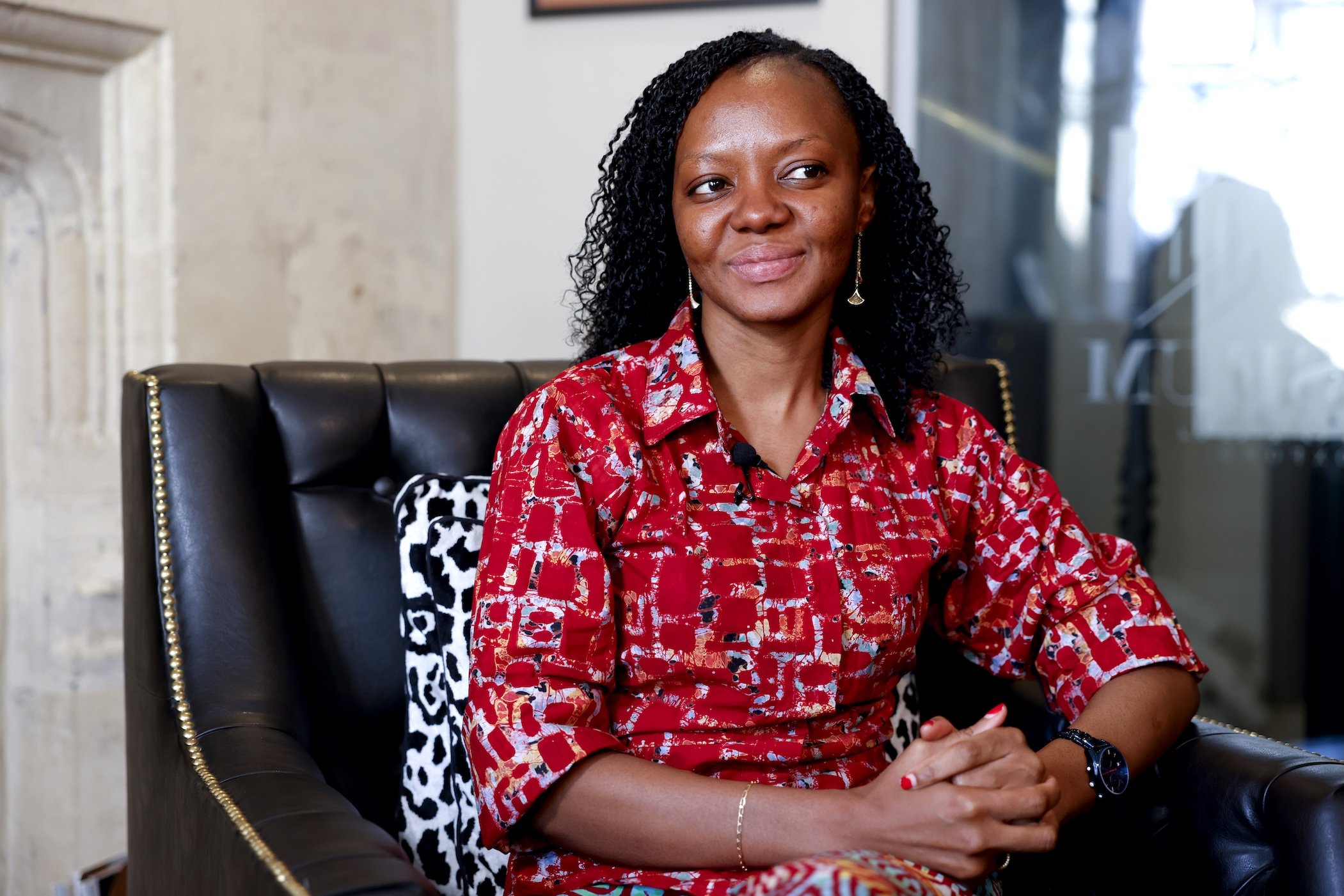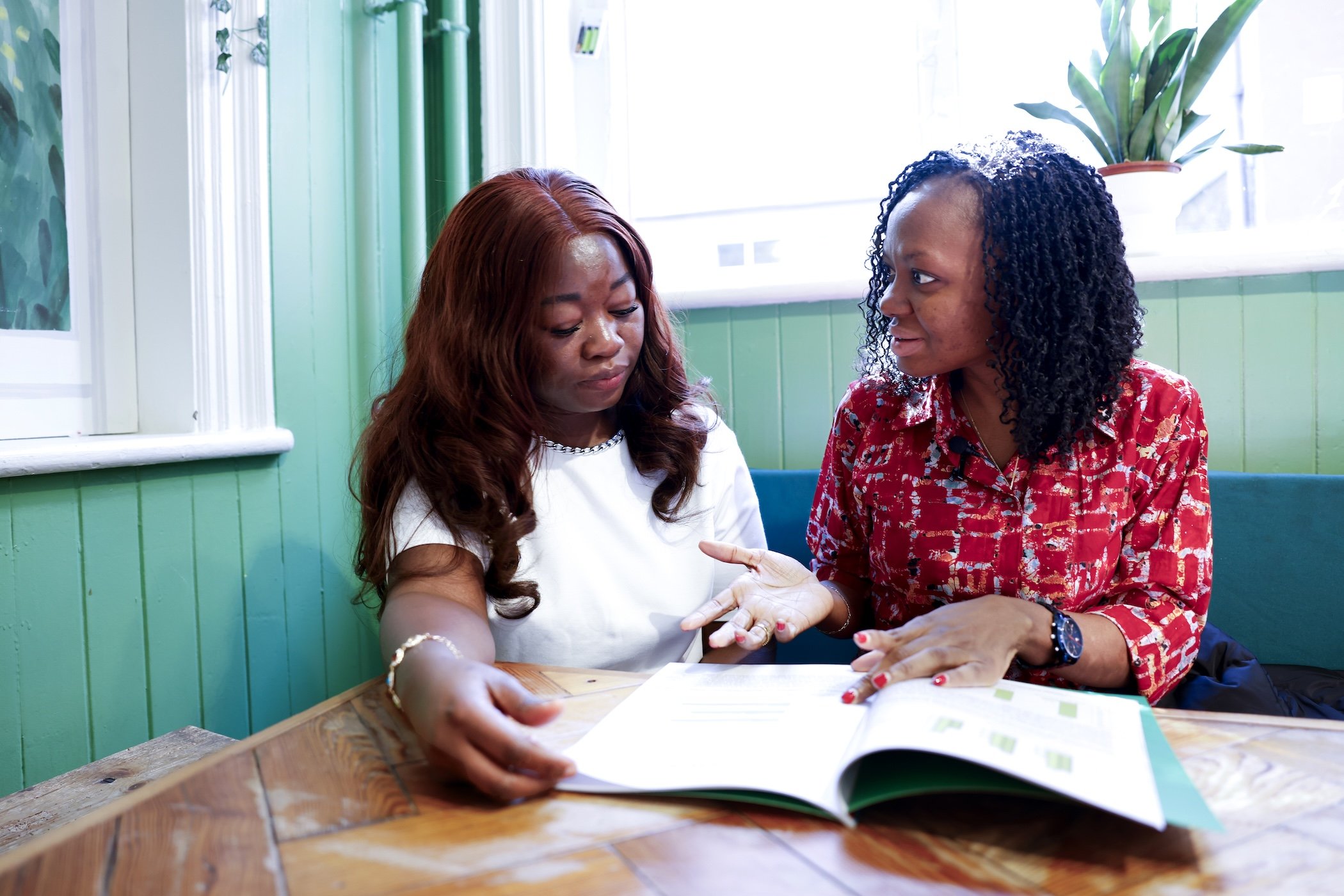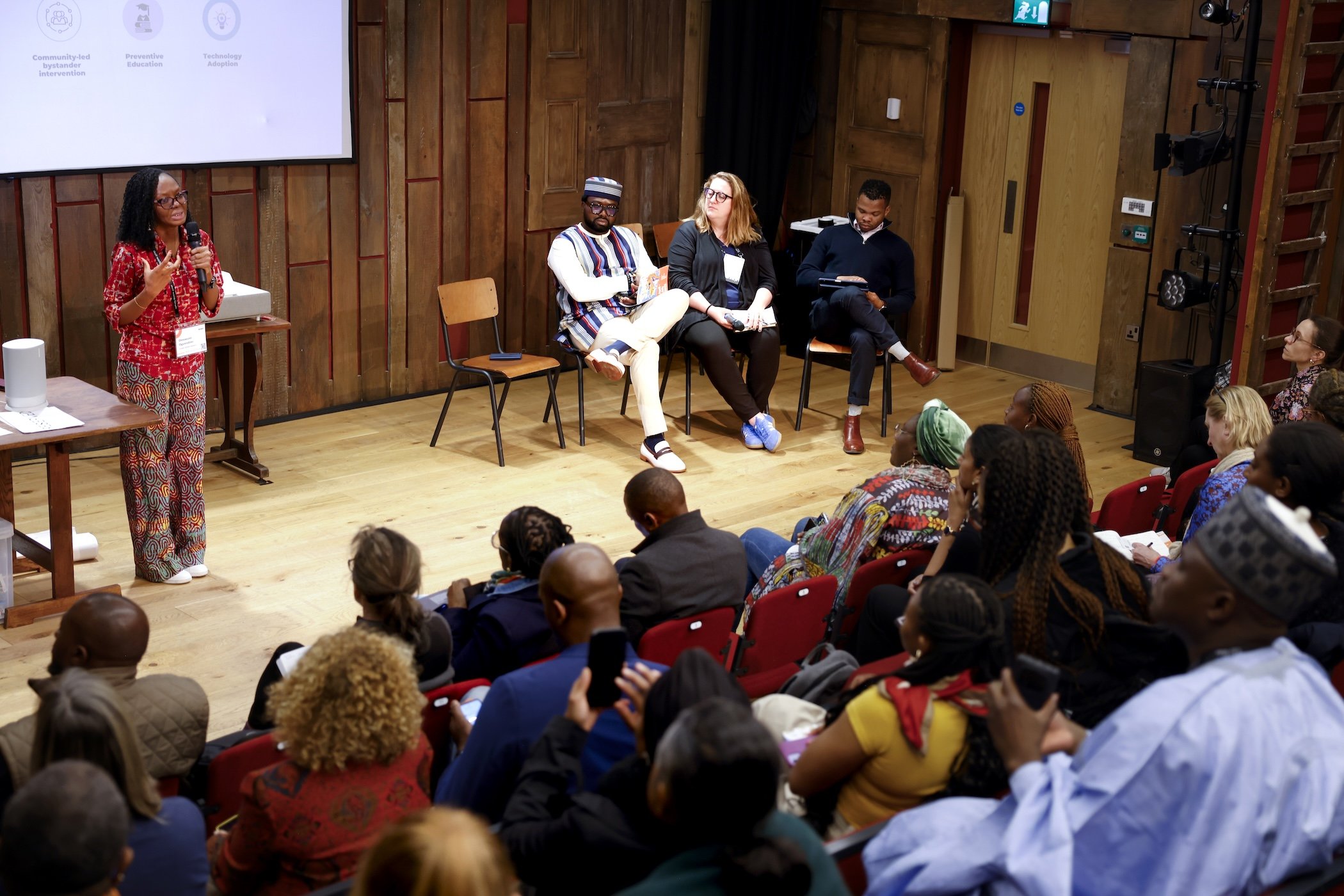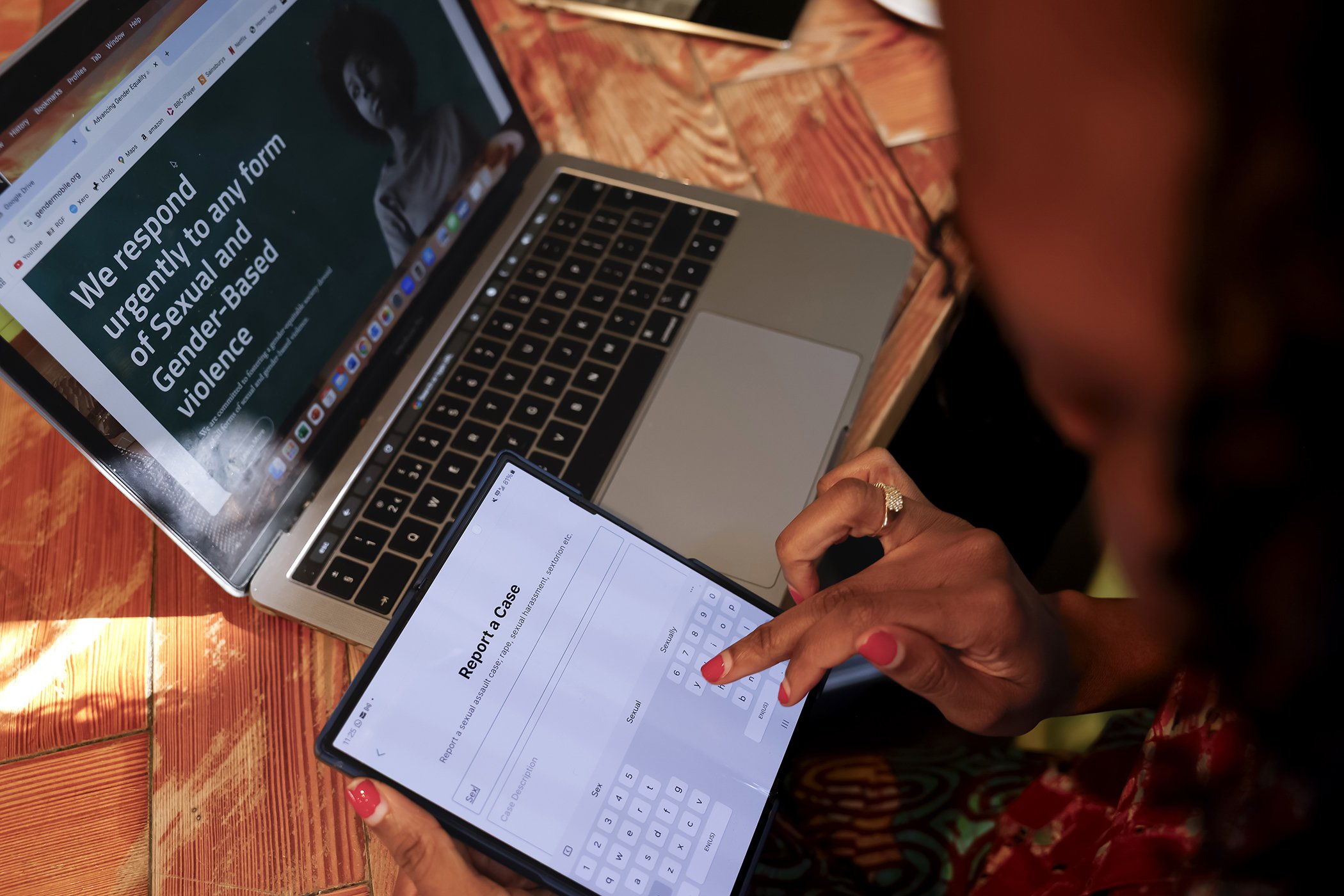In Nigeria, gender-based violence against women and girls is at alarming levels, with reports indicating a troubling rise in femicide cases, in fact, 133 deaths were reported in 2024 alone, according to Femicide Nigeria.
Amidst this daunting landscape, advocacy groups and individuals are emerging to combat gender-based violence in Nigeria. One such figure is Omowumi Ogunrotimi, a 35-year-old feminist lawyer, activist and founder of Gender Mobile Initiative — a youth-led organisation using technology to combat sexual and gender-based violence. With more than a decade of experience, Ogunrotimi works tirelessly to transform societal structures that perpetuate violence against women — which is why she’s a Global Citizen Prize winner for 2025.
Ogunrotimi’s journey into activism was shaped by her own experience as a suvivor of sexual abuse at the age of 14, this personal experience of trauma and injustice led her to pursuing a career in law and advocacy.
Reflecting on her past, Ogunrotimi acknowledges the support she received from her parents during her healing process from her abuse, yet, she questioned her parents decision to keep her story private at the time and not seek the justice she deserved — a reflection of the cultural stigma surrounding sexual abuse in Nigeria.
“I continually questioned why. Why do we have to make this a private affair? Why is this man still roaming the street freely? And then I kept on seeing interactions of him with other young girls like me, when I saw that, I relived the trauma and a part of me felt that other girls were going to go through what I went through,” she recalls.
This experience heightened Ogunrotimi’s awareness of the lack of legal support for survivors seeking justice and made her recognize the pressing need for reform in policies surrounding gender-based violence in Nigeria. Inspired by figures like the late activist Gani Fawehinmi and Justice Eddie Ojuolape, she has since dedicated her life’s work to championing women’s rights and working to provide justice for survivors.
As a feminist lawyer, Ogunrotimi finds fulfillment in shaping policies that influence lives. “Getting to shape policies that transform cultures and provide justice is immensely fulfilling,” she tells Global Citizen.
 2025 Global Citizen Prize winner Omowumi Ogunrotimi is transforming Nigeria’s battle against gender-based violence.
2025 Global Citizen Prize winner Omowumi Ogunrotimi is transforming Nigeria’s battle against gender-based violence.
Yet, she finds the daily reports of violence against women and girls in Nigeria disheartening. “If there is anything that I really don't like about my work, it’s the fact that we do this work and on some days we wake up to news on national television that makes it look like we are not doing anything as a people, as an organisation, and even as a country,” she explains.
She continues: “It makes me question the essence of this work sometimes, it makes me sometimes invalidate our approach. But I continue to take solace in that the situation could be worse if we were not doing anything.”
 Global Citizen Prize winner and founder of Gender Mobile Initiative, Omowumi Ogunrotimi, sits with her colleague, Iyanuoluwa Olajungbesi.
Global Citizen Prize winner and founder of Gender Mobile Initiative, Omowumi Ogunrotimi, sits with her colleague, Iyanuoluwa Olajungbesi.
Ogunrotimi finds strength in her team — fellow young activists who share similar experiences of injustice and are determined to continue the work.
The factors fueling gender-based violence in Nigeria are complex, as Ogunrotimi put it: “It reflects what I would call deep rooted societal, cultural, and even systemic challenges.”
“[Nigeria is a] predominantly patriarchal society where power dynamics are heavily skewed in favor of men, this creates an environment in which women and girls are seen as subordinates,” Ogunrotimi explains.
She adds: “It continually perpetuates a culture of silence and impunity. The sad thing is that when silence becomes a culture, when it comes to occurrence or prevalence of sexual violence, it would normalize violence. When violence becomes a tool of control, when women speak out against it, they will be blamed and they will be stigmatized, if not victimized.”
In response to this, Ogunrotimi founded the Gender Mobile initiative in 2017. The aim of the initiative is to advance gender equality and end all forms of sexual and gender-based violence against women and girls in Nigeria through targeted legal advocacy, public awareness, and community engagement. The Gender Mobile Initiative has been influential in advocating for anti-sexual harassment policies in the country, successfully facilitating the approval of a model policy that has been adopted by 27 states and 150 higher education institutions across Nigeria.
 Omowumi Ogunrotimi, founder of Gender Mobile Initiative, speaks at a side event co-convened by Helpmum during the Skoll Forum in Oxford, UK, 2025.
Omowumi Ogunrotimi, founder of Gender Mobile Initiative, speaks at a side event co-convened by Helpmum during the Skoll Forum in Oxford, UK, 2025.
The organisation continues to push for stronger laws to combat sexual and gender-based violence, creating systemic change at both the national and local levels. Through community awareness programs, Gender Mobile has helped to challenge harmful social norms that enable gender-based violence and offer survivors legal and psychological support.
Across Nigerian universities, the Campus Pal mobile app, created by Ogunrotimi and the team at Gender Mobile Initiative, is making significant strides in addressing a critical issue: sexual and gender-based violence. The app aims to create a safer learning environment for students while fostering community support and engagement.
 Omowumi Ogunrotimi, founder of Gender Mobile Initiative, uses a feature on The Campus Pal app designed to promote safe and confidential reporting of sexual harassment cases in Nigerian universities.
Omowumi Ogunrotimi, founder of Gender Mobile Initiative, uses a feature on The Campus Pal app designed to promote safe and confidential reporting of sexual harassment cases in Nigerian universities.
In 2021, Ogunrotimi was inspired to develop the Campus Pal app after noticing the high prevalence of reported sexual and gender-based violence cases within universities.
“Higher education institutions have become the center for sexual harassment and this has gained a lot of attention due to the numerous reports of abuse” Ogunrotimi told Global Citizen. Her organization initially included a call center for reporting sexual and gender-based violence within local communities in Nigeria. In the first year of operating the centre, they discovered that about 80% of the 137 reports received that year came from campus communities; this highlighted the need for Gender Mobile Initiative to expand the scope of their services and create tailored solutions in educational settings.
Ogunrotimi also noted a shift in the perception that universities are safe havens.
“A lot of people assume that learning environments are safe, the same way you wake up on a sunday morning, go to church, and assume that it is a place you can seek refuge,” she explains.
She continues:You assume that is the safest place to be, so people don’t shine the light on spaces like that [as dangerous places to be]. I guess the presumption is changing now, and predators have been gradually shifting to those places” she explains.
The Campus Pal app emerged from this realization, designed not only to help promote safe, confidential reporting of sexual harassment within university settings and help with data collection, but also as Ogunrotimi passionately notes, the app “also aids institutional accountability.”
The response to the Campus Pal app has been overwhelmingly positive. Ogunrotimi shared with Global Citizen that students have embraced the app as a vital community space: “ they can engage in discussions about campus life and safety, and that means a lot to us,” she shares.
She goes on: “There is also the opportunity to connect with other students, share essential information so that they can acclimate to campus life.”
On Oct. 30, 2024, The House of Representatives in Nigeria passed the Sexual Harassment Prevention, Prohbition, and Redressal Tertiary Educational Instutional bill, designed to prevent and tackle sexual harrasment at tertiary institutions, this includes universities. Under this bill individuals convicted of sexual harassment may face up to 14 years in prison, while heads of institutions who do not properly address complaints could face 5 years in prison or a fine of 5 million naria (over $3,000). Though introduced in 2016, and then again in 2019, the bill has yet to be signed into law, as it faced setbacks, that was until 2023 with the arrival of a new president, the bill found itself on President Bola Tinubu’s desk — yet two years later it remains unsigned.
Gender Mobile Initiative has played a pivotal role in advocating for the passage of the bill and have called on President Tinubu to sign the bill into law.
“Such a framework will positively redefine the culture and climate of learning environments in several ways, such as the provision of formal legal protection for survivors, mandatory reporting, and institutional accountability,” says Ogunrotimi, “providing a proactive approach to sexual harassment prevention and empowerment of individuals to take action, ensuring that the safety, dignity and rights of women and girls are preserved, protected, and guaranteed.”
To support this effort, Gender Mobile Initiative launched a nationwide campaign called ‘Donate a Pen to Mr President, which encouraged students from tertiary institutions across Nigeria to donate their pens to President Tinubu, with the goal of prompting him to swiftly sign the bill into law. The passing of this bill is vital for providing legal protection to students in higher education institutions against sexual harassment.
Reflecting on being a recipient of the 2025 Global Citizen Prize, Ogunrotimi describes the honor as a validation of her organization’s work and dedication to the pressing challenge of gender-based violence.
“This prize will help amplify our impact and attract additional support for our initiatives,” she tells Global Citizen. “When I think about this prize, this speaks to my leadership, putting in the work, but I'm only as strong as my team, so it really goes to them.”
As Ogunrotimi continues her fight against gender-based violence in Nigeria, her story is a testament to the power of resilience, advocacy, and collective action. The path toward gender equality is fraught with challenges, but with voices like hers at the forefront, change is on the horizon.